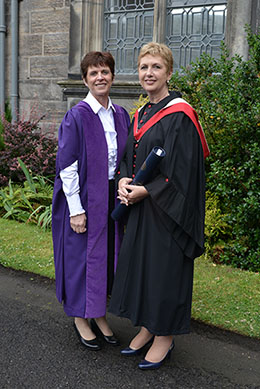Laureation address – Professor Mary McAleese
Professor Mary McAleese
Honorary Degree of Doctor of Laws
Laureation by Professor Andrew Murphy
School of English
 Chancellor, it is my privilege to present for the Degree of Doctor of Laws, honoris causa, Professor Mary McAleese.
Chancellor, it is my privilege to present for the Degree of Doctor of Laws, honoris causa, Professor Mary McAleese.
Professor McAleese was born in Belfast and two signal events stand out in her childhood. Firstly, when she was a young girl, her family were forced to flee their home when their neighbourhood was attacked by a sectarian mob. Experiences of this kind confirmed many in the Northern Ireland of those years in a sectarianism of their own – a sectarianism rooted in an understandable desire for revenge. In Mary McAleese, by contrast, the experience fostered a desire to understand conflict – and a life-long desire to work towards resolution rather than retribution.
Later in her young life, Professor McAleese announced to her family that she wanted to pursue a career as a lawyer. A visitor who happened to be in the home on that occasion immediately told her: “You can’t – because you are a woman”. Luckily, she had a strong mother who responded by pointing to the visitor and shouting: “You – out!” Turning to her daughter she said: “And you, ignore him!”
Ignore him Professor McAleese certainly did, going on to study at Queen’s University in Belfast and at Trinity College Dublin before becoming a member of the Irish Bar. In 1975, she was appointed Reid Professor of Criminal Law, Criminology and Penology at Trinity and she later served as Director of the Institute of Professional Legal Studies back at Queen’s. She also went on to become that university’s first ever woman Pro-Vice Chancellor.
Professor McAleese always had a strong interest in politics – perhaps inevitable in someone who experienced at first hand so much of Northern Ireland’s troubled history. In 1997 she stood as a candidate in Ireland’s presidential election, winning in the second round by a clear majority and becoming the Republic’s eighth president – and the first to have been born in Ulster. At the end of her seven-year term she indicated that she would be willing to serve again and, such was her popularity, that no other candidate stood against her and she was returned unopposed.
Perhaps remembering her own experience of sectarian terror, she made ‘building bridges’ the central theme of her presidency. It was an entirely apt choice, in the era of the emerging Anglo-Irish peace process. Not that it was an easy time: Professor McAleese herself has nicely likened the peace process to “a tangled ball of wool being carefully untangled by a herd of spitting cats”. It was a time of extraordinary events and encounters. As President, Professor McAleese played a full part in these events, announcing, for example, that, in addition to celebrating St Patrick’s Day, she would, as President, also honour the Twelfth of July – a key holiday for unionists in Ireland. She also invited many loyalist militants to come visit her in Dublin. One such activist subsequently observed: “Those visits changed our world [and] we now understand each other a lot better because of that work”.
In 2011, Professor McAleese welcomed Queen Elizabeth II to Ireland – the first ever visit by a British monarch to the Republic. Famously, the Irish president was heard, off mic, to say “Wow!” when the Queen began one of her official speeches with a few words spoken in the Irish language. The entire visit can be said, surely, to have had a ‘wow factor’ for many people in these islands.
After a career that spanned prestigious academic posts and a fourteen-year stint as President of her country, and that took in such diverse other roles along the way as directorships at Channel 4, Northern Ireland Electricity and the Royal Group of Hospitals Trust – not to mention time spent working as a broadcaster and a journalist – one might have expected Professor McAleese to have put her feet up when her second term as President came to an end. Not a bit of it: she has since busied herself with the small matter of studying for an advanced degree in canon law at the Gregorian University in Rome. A case, perhaps, of ‘no rest for the virtuous’.
When Professor McAleese left office as president, she returned about €500,000 in unused presidential allowances to the Irish exchequer. We have come, in our time, sadly, not to expect such levels of integrity and fidelity to duty from our politicians. But Mary McAleese, in this, as in so many other areas of her career, is exceptional. And perhaps, looking back over that long career, we can say that the infamous visitor to her childhood home was right in an odd way: Mary couldn’t be a lawyer, not because she’s a woman, but because her talents and her passions and her will to serve have always outrun what any single profession could encompass.
Chancellor, in recognition of her major contribution to many fields, including law, academia and politics, I invite you to confer on Professor Mary McAleese the Degree of Doctor of Laws, honoris causa.
Category Awards